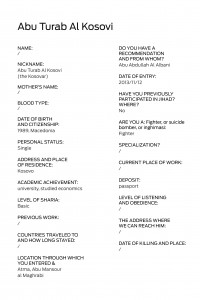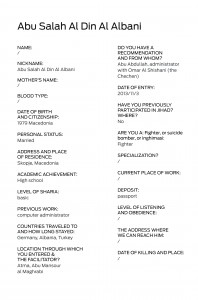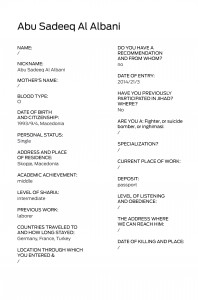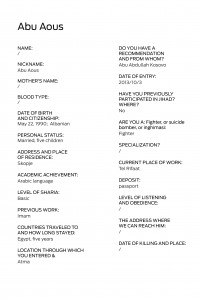

ISIS recruits from Macedonia have poor understanding of Islam, even though one was an imam in Skopje.
Four recently leaked ISIS registration forms show that recruits from Macedonia have a poor understanding of Islamic doctrine. Three of the fighters, all from the capital Skopje, are part of Macedonia’s ethnic Albanian minority. One of them was an Imam from Skopje, who knew Arabic and studied in Egypt. A fourth is originally from Kosovo.
One of the men, nicknamed Abu Salah Al Din Al Albani, listed as a reference Abu Abdullah al-Kosovi, which is the nom de guerre of Kosovo ISIS fighter Lavdrim Muhaxheri. According to the form, his introduction occurred with the supervision of Omar Al Shishani (“the Chechen”), a high level ISIS operative. Shishani was pronounced dead by the United States in mid-March following a U.S. airstrike.
 Prishtina received these files from the online media portal “Zaman al Wasi” and they have not been authenticated. They show that none of the four fighters had a high understanding of the Islamic faith, although one of the fighters declared to have worked as a local imam in Macedonia. Other fighters include a student of economics, an IT worker and a laborer.
Prishtina received these files from the online media portal “Zaman al Wasi” and they have not been authenticated. They show that none of the four fighters had a high understanding of the Islamic faith, although one of the fighters declared to have worked as a local imam in Macedonia. Other fighters include a student of economics, an IT worker and a laborer.
The files, which were leaked by a disillusioned ISIS operative, are filled in by bureaucrats upon a fighter’s entry into their territory, and serve as a registration form for new ISIS members. Each entrant is asked 23 questions, including the new recruit’s ‘career choice,’ in which he can choose between being a fighter, suicide bomber, or inhigmasi, a fighter who does not expect to return home.
The four Macedonian ISIS recruits did not have a high understanding of Islam, although at least one served as an imam in Macedonia. It is unclear how someone with a basic level of understanding of the Islamic faith could serve as a preacher in a mosque.
“Him declaring that he was an imam in Macedonia does not necessarily mean that he was an actual imam assigned by the Islamic Community in Macedonia,” says Shpend Kursani, an expert on radicalisation. “These people sometimes call themselves ‘imam’ just because they lecture in private meetings, or post speeches on Facebook or Youtube, or lecture to very young victims who have no clue what this person is talking about.”
 This local imam, nicknamed Abu Uwais, was 23 years old and had five children at the time the form was filled out. Unlike the other recruits in this batch, Abu Uwais knew Arabic well, having lived in Egypt for five years.
This local imam, nicknamed Abu Uwais, was 23 years old and had five children at the time the form was filled out. Unlike the other recruits in this batch, Abu Uwais knew Arabic well, having lived in Egypt for five years.
Egypt-educated imams from Macedonia helped spread extreme ideology in Kosovo, says Mentor Vrajolli of the Kosovar Centre for Security Studies.
“Radicial Islam came to Kosovo through individuals who were educated in the Arab world, in states that were more autocratic,” says Vrajolli. “It came through imams educated in Egypt, imams from Macedonia.”
Another fighter nicknamed Abu Turab had studied economics in Kosovo. It is unclear if Abu Turab finished his studies, but prior to his registration with ISIS he did not work. Of the two remaining entrants, one was an IT worker, while the other claimed to have been a laborer after finishing high school.
It remains unclear if these fighters are still living or dead. If the fighters are still alive, the registration form can serve as an important court evidence that could be presented upon a possible return of the jihadis.
Kosovo has the highest number of cases against jihadists in Europe, with more than 50 people on trial for terrorism.
Vrajolli said that it is important to note that in the early days of the Syrian war, Kosovars who left for Syria might have not gone because of radical views, but potentially also because of “humanist principles.”
 “In a way there was a global call to participate,” he says, and the extreme element of Balkan fighters’ participation in the Islamic State was not known “until the terrifying videos in 2014 of Albanian extremists appeared.”
“In a way there was a global call to participate,” he says, and the extreme element of Balkan fighters’ participation in the Islamic State was not known “until the terrifying videos in 2014 of Albanian extremists appeared.”
Leaders of Kosovo’s Islamic community contend that they have gone to great lengths to discourage Kosovars from traveling to Syria to join armed groups.
“Since the appearance of all these problems of the Muslim world, but especially of those who have went to Syria or those young boys who have been brainwashed, the Islamic Community of Kosovo has had a clear stance on going to fight or participate in the war in Syria: going to Syria is wrong,” said Bahri Sejdiu, the Imam of Prishtina’s Great Mosque.
“It is our duty to explain what we preach and what [kind of] Islam needs to be practiced in life. Our aim is to remove that way of thinking – of thinking that someone should go to Syria.”
 These documents are the second batch of files that are published by Prishtina Insight about ethnic Albanian fighters. Earlier in March six files were published about Kosovar fighters who joined the Islamic State. Zaman al Wasi says they posses documents for at least 25 fighters from Albania, 23 from Kosovo and eight from Macedonia.
These documents are the second batch of files that are published by Prishtina Insight about ethnic Albanian fighters. Earlier in March six files were published about Kosovar fighters who joined the Islamic State. Zaman al Wasi says they posses documents for at least 25 fighters from Albania, 23 from Kosovo and eight from Macedonia.
The Syrian source of these files removed the names and method of communication with the recruits. Deputy editor Ethar Abdulhaq of the Zaman al Wasl portal explained in a written statement to Prishtina Insight that out of respect to the fighters’ family members, this personal information is censored from the files.
28 March 2016 - 15:34

MPs in both Kosovo and Albania on Thursday adopted declarations in sup...

Kosovo, Bulgaria and Turkey have signed the Board of Peace Charter, un...

For more than two decades, disinformation in Kosovo has fueled ethnic ...

A small neighbourhood in central Albania became a new home for many et...